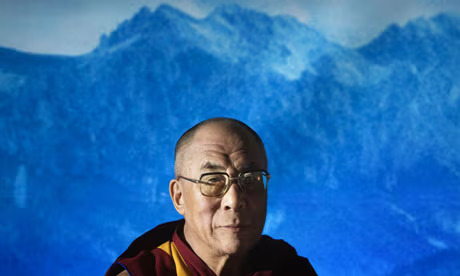The Dalai Lama, as the spiritual leader of Tibet, has had a profound and enduring impact on the Tibetan people throughout his lifespan. His Holiness the 14th Dalai Lama, Tenzin Gyatso, has been a beacon of hope and a symbol of resilience for Tibetans both in Tibet and in exile. Born on 6 July 1935, he was recognised as the reincarnation of the 13th Dalai Lama at the tender age of two. Since then, his life has been intertwined with the fate of the Tibetan people.
The Dalai Lama’s leadership and his commitment to nonviolence and compassion have been central to the identity of the Tibetan people. His escape from Tibet in 1959, following the Chinese crackdown, marked a significant turning point for Tibetans. This event not only changed the concept of Buddhism forever but also solidified the Dalai Lama’s role as the face of Tibetan Buddhism and the struggle for Tibetan autonomy on the global stage.
In exile, the Dalai Lama has worked tirelessly to preserve Tibetan culture and promote the cause of Tibet. He has established a democratic government-in-exile and has been a vocal advocate for human rights and environmental issues. His efforts have ensured that the Tibetan language, culture, arts, and religion continue to thrive among the diaspora.
The relationship between the Dalai Lama’s lifespan and the Tibetan people is one of deep spiritual and cultural significance. His presence has been a source of comfort and guidance for generations of Tibetans. As he ages, the question of his succession becomes increasingly important, with concerns about the continuity of leadership and the preservation of Tibetan identity.
The Dalai Lama’s impact on the Tibetan people is immeasurable. He has shaped the Tibetan struggle and has been a guiding light for a community facing immense challenges. His life has been a testament to the power of peace and the strength of the human spirit in the face of adversity. As Tibetans continue to navigate their future, the Dalai Lama’s teachings and his example of compassionate leadership will undoubtedly continue to influence their path.
The Dalai Lama has recently undergone successful knee surgery in the United States. His personal physician has confirmed that the procedure went well and that he is in stable condition. This news has been met with widespread joy, particularly within the Tibetan community, as the Dalai Lama is a revered figure not only as a spiritual guide but also as a symbol of their national identity and struggle for autonomy.
The Dalai Lama’s health is of paramount importance to Tibetans worldwide, and his successful surgery is a beacon of hope. It signifies not just the promise of his continued presence and guidance but also serves as a reminder of the ongoing Tibetan issue. The Dalai Lama has long been at the forefront of the non-violent struggle for Tibet’s cultural and religious identity, and his ability to engage in this cause is crucial.
However, the resolution of the Tibetan issue extends beyond the health of any single individual. It is a complex geopolitical matter that involves historical grievances, cultural preservation, and international diplomacy. The Dalai Lama’s recovery is indeed a positive development, but it also underscores the need for sustained dialogue and concerted efforts from all stakeholders to find a peaceful and lasting solution.
As the Dalai Lama recuperates, it is hoped that his continued advocacy for peace and dialogue will inspire further progress on the Tibetan issue. His teachings and leadership have always emphasized the power of compassion and understanding in resolving conflicts, and perhaps this recent event can serve as a catalyst for renewed efforts towards reconciliation and harmony.
Joe BIDEN MUST MEET THE DALA LAMA
The Dalai Lama’s visit to the US marks a rare opportunity for President Joe Biden to meet with the Tibetan spiritual leader, an encounter that would carry significant symbolic weight and reaffirm America’s commitment to human rights and religious freedom.
The Dalai Lama’s presence in the United States is not just a matter of medical convenience but a confluence of moral imperatives and diplomatic subtleties. President Biden’s administration has recently shown a willingness to engage with the issues surrounding Tibet, as evidenced by the bipartisan congressional delegation’s meeting with the Dalai Lama in Dharamshala. This legislation underscores the importance of dialogue and peaceful resolution, principles that are deeply aligned with the Dalai Lama’s lifelong mission.
Meeting the Dalai Lama would send a clear message to the world: the United States stands firm on its values, even in the face of potential geopolitical repercussions. It would demonstrate that America does not shy away from supporting those who advocate for non-violence and self-determination. Furthermore, it would honour the Dalai Lama’s enduring advocacy for the autonomy of Tibet, a cause that has garnered international attention and sympathy.
The significance of such a meeting extends beyond the political sphere; it is a gesture of respect towards a figure who has dedicated his life to promoting compassion and understanding among people of all nations. The Dalai Lama’s teachings transcend borders and ideologies, resonating with the universal aspirations for peace and dignity.
President Biden’s meeting with the Dalai Lama would also serve as a beacon of hope for the Tibetan people and all those who struggle under oppressive regimes. It would reaffirm the United States’ unwavering support for human rights and the freedom of belief, signalling to the world that these are not merely abstract concepts but pillars of American foreign policy.
In conclusion, the convergence of the Dalai Lama’s visit to New York for medical
Khedroob Thondup, the son of Gyalo Thondup, elder brother of the Dalai Lama, is a geopolitical analyst.

